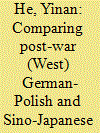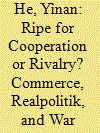| Srl | Item |
| 1 |
ID:
108066


|
|
|
|
|
| Publication |
2011.
|
| Summary/Abstract |
The article argues that the harmonisation of national memories facilitates genuine reconciliation, while memory divergence resulting from national mythmaking hampers reconciliation. After World War II, Sino-Japanese and West German-Polish relations were antagonised by the Cold War structure, and pernicious myths prevailed in national collective memory. Then China and Japan brushed aside historical legacy for immediate diplomatic normalisation, but their reconciliation was impeded by elite mythmaking practices. Since the 1970s West Germany and Poland have de-mythified war history and engaged in historical settlement, paving the way for deep reconciliation after the Cold War.
|
|
|
|
|
|
|
|
|
|
|
|
|
|
|
|
| 2 |
ID:
076960


|
|
|
|
|
| Publication |
2007.
|
| Summary/Abstract |
Anti-Japanese popular nationalism is rising high in China today. Little evidence to date proves that it is officially orchestrated. Nonetheless, Chinese popular nationalism still has deep roots in the state's history propaganda which has implanted pernicious myths in the national collective memory. Fueling mistrust and exacerbating a mutual threat perception, popular nationalism could be a catalyst for future Sino-Japanese conflict over the Taiwan problem, island disputes, and maritime resource competition. The increasingly liberalized but often biased Chinese media, the role of nationalist sub-elites, and the government's accommodation have all contributed to the strength of anti-Japanese nationalism, which cannot be mitigated by bilateral economic interdependence. To rid bilateral relations of the negative historical legacy, the two countries need the vision and determination to remove nationalistic myths and promote a shared history through mutual critique and self-reflection in transnational historians' dialogues.
|
|
|
|
|
|
|
|
|
|
|
|
|
|
|
|
| 3 |
ID:
135968


|
|
|
|
|
| Summary/Abstract |
ON 7 SEPTEMBER 2010, A CHINESE FISHING BOAT collided with two Japanese Coast Guard vessels near the disputed Diaoyu/Senkaku Islands within Japan's claimed exclusive economic zone. The Japanese Coast Guard detained the crew and ship but thereafter let them go, only to hand over the Chinese captain to prosecutors for obstructing its execution of duties. The Chinese government immediately protested to Japan and demanded the release of the captain. The situation only calmed down in late September when the Japanese government set the captain free but refused to apologize or give compensation.
|
|
|
|
|
|
|
|
|
|
|
|
|
|
|
|
| 4 |
ID:
082183


|
|
|
|
|
| Publication |
2008.
|
| Summary/Abstract |
Sino-Japanese political relations, fraught with disputes and tension during the Koizumi years, only began to recover after Abe came to power. This article investigates the driving forces shaping recent and future bilateral relations. Using evidence from the Koizumi era, I argue that 1) bilateral commercial links prove a weak stabilizing factor for political relations; 2) the current distribution of power between China and Japan does not dictate their strategic rivalry, but they may still treat each other as rivals if they perceive the danger of long-term power transition and mutual hostile intent; 3) the frequent flare-up of bilateral history disputes can exacerbate mutual threat perceptions among elites and generate popular emotional pressure for hard-line government policy toward the other country. The future of Sino-Japanese cooperation heavily depends on their efforts to resolve the negative historical legacy
|
|
|
|
|
|
|
|
|
|
|
|
|
|
|
|